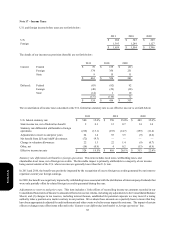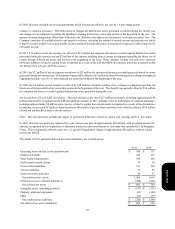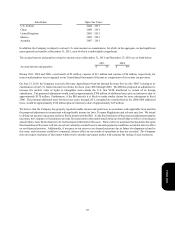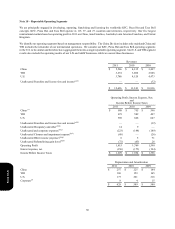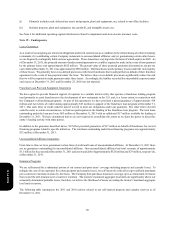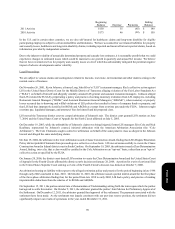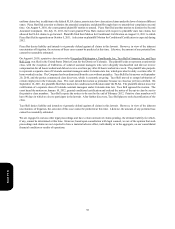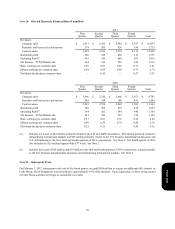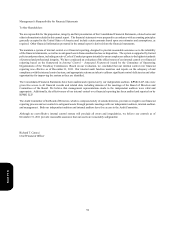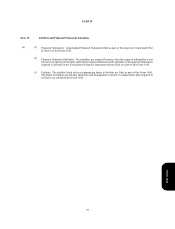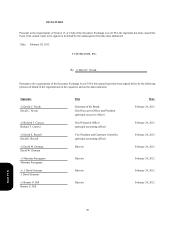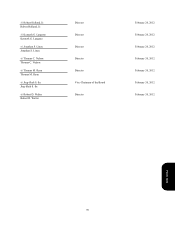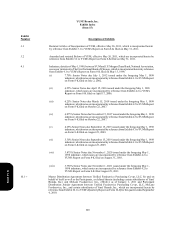Pizza Hut 2011 Annual Report Download - page 194
Download and view the complete annual report
Please find page 194 of the 2011 Pizza Hut annual report below. You can navigate through the pages in the report by either clicking on the pages listed below, or by using the keyword search tool below to find specific information within the annual report.
90
On August 4, 2006, a putative class action lawsuit against Taco Bell Corp. styled Rajeev Chhibber vs. Taco Bell Corp. was filed
in Orange County Superior Court. On August 7, 2006, another putative class action lawsuit styled Marina Puchalski v. Taco Bell
Corp. was filed in San Diego County Superior Court. Both lawsuits were filed by a Taco Bell RGM purporting to represent all
current and former RGMs who worked at corporate-owned restaurants in California since August 2002. The lawsuits allege
violations of California's wage and hour laws involving unpaid overtime and meal period violations and seek unspecified amounts
in damages and penalties. The cases were consolidated in San Diego County as of September 7, 2006.
On January 29, 2010, the court granted the plaintiffs' class certification motion with respect to the unpaid overtime claims of
RGMs and Market Training Managers but denied class certification on the meal period claims. The court has ruled that this case
will be tried to the bench rather than a jury. Trial began on February 15, 2012.
Taco Bell denies liability and intends to vigorously defend against all claims in this lawsuit. We have provided for a reasonable
estimate of the cost of this lawsuit. However, in view of the inherent uncertainties of litigation, there can be no assurance that this
lawsuit will not result in losses in excess of those currently provided for in our Consolidated Financial Statements.
Taco Bell was named as a defendant in a number of putative class action suits filed in 2007, 2008, 2009 and 2010 alleging violations
of California labor laws including unpaid overtime, failure to pay wages on termination, failure to pay accrued vacation wages,
failure to pay minimum wage, denial of meal and rest breaks, improper wage statements, unpaid business expenses, wrongful
termination, discrimination, conversion and unfair or unlawful business practices in violation of California Business & Professions
Code §17200. Plaintiffs also seek penalties for alleged violations of California's Labor Code under California's Private Attorneys
General Act and statutory “waiting time” penalties and allege violations of California's Unfair Business Practices Act. Plaintiffs
seek to represent a California state-wide class of hourly employees.
On May 19, 2009 the court granted Taco Bell's motion to consolidate these matters, and the consolidated case is styled In Re Taco
Bell Wage and Hour Actions. The In Re Taco Bell Wage and Hour Actions plaintiffs filed a consolidated complaint on June 29,
2009, and on March 30, 2010 the court approved the parties' stipulation to dismiss the Company from the action. Plaintiffs filed
their motion for class certification on the vacation and final pay claims on December 30, 2010, and the class certification hearing
took place in June 2011. Taco Bell also filed, at the invitation of the court, a motion to stay the proceedings until the California
Supreme Court rules on two cases concerning meal and rest breaks. On August 22, 2011, the court granted Taco Bell's motion to
stay the meal and rest break claims. On September 26, 2011, the court issued its order denying the certification of the remaining
vacation and final pay claims. The plaintiffs have not moved for class certification on the remaining claims in the consolidated
complaint.
Taco Bell denies liability and intends to vigorously defend against all claims in this lawsuit. However, in view of the inherent
uncertainties of litigation, the outcome of this case cannot be predicted at this time. Likewise, the amount of any potential loss
cannot be reasonably estimated.
On September 28, 2009, a putative class action styled Marisela Rosales v. Taco Bell Corp. was filed in Orange County Superior
Court. The plaintiff, a former Taco Bell crew member, alleges that Taco Bell failed to timely pay her final wages upon termination,
and seeks restitution and late payment penalties on behalf of herself and similarly situated employees. This case appears to be
duplicative of the In Re Taco Bell Wage and Hour Actions case described above. Taco Bell filed a motion to dismiss, stay or
transfer the case to the same district court as the In Re Taco Bell Wage and Hour Actions case. The state court granted Taco Bell's
motion to stay the Rosales case on May 28, 2010. After the denial of class certification in the In Re Taco Bell Wage and Hour
Actions, the court granted the plaintiff leave to amend her lawsuit, which the plaintiff filed and served on January 4, 2012. Taco
Bell filed its responsive pleading on February 8, 2012.
Taco Bell denies liability and intends to vigorously defend against all claims in this lawsuit. However, in view of the inherent
uncertainties of litigation, the outcome of this case cannot be predicted at this time. Likewise, the amount of any potential loss
cannot be reasonably estimated.
On October 2, 2009, a putative class action, styled Domonique Hines v. KFC U.S. Properties, Inc., was filed in California state
court on behalf of all California hourly employees alleging various California Labor Code violations, including rest and meal
break violations, overtime violations, wage statement violations and waiting time penalties. Plaintiff is a former non-managerial
KFC restaurant employee. KFC filed an answer on October 28, 2009, in which it denied plaintiff's claims and allegations. KFC
removed the action to the United States District Court for the Southern District of California on October 29, 2009. Plaintiff filed
a motion for class certification on May 20, 2010 and KFC filed a brief in opposition. On October 22, 2010, the District Court
granted Plaintiff's motion to certify a class on the meal and rest break claims, but denied the motion to certify a class regarding
alleged off-the-clock work. On November 1, 2010, KFC filed a motion requesting a stay of the case pending a decision from the
Form 10-K




